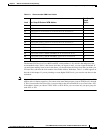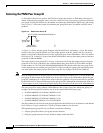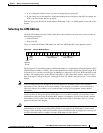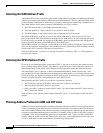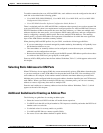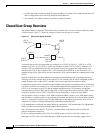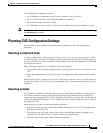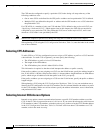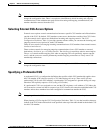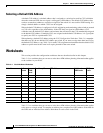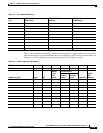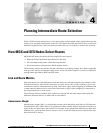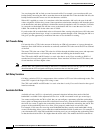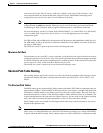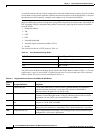
3-17
Cisco PNNI Network Planning Guide for MGX and SES Products, Release 5
Part Number OL-3847-01 Rev. D0, April, 2004
Chapter 3 Address and Closed User Group Planning
Planning CUG Configuration Settings
Note The network administrator can set the internal access during the initial CUG member configuration, or
change the configuration later. There is no option to simultaneously block incoming and outgoing
communications. If the administrator needs to block incoming and outgoing communications, the
member should be removed from the CUG.
Selecting External CUG Access Options
External access options control communications between a specific CUG member and all destinations
outside of the CUG. By default, CUG members cannot access destinations outside of the CUG. In the
CLI, the external access options are divided into incoming and outgoing controls. The CUG
Configuration Worksheet, Table 3-6 provides separate columns where you can enter the incoming and
outgoing external access options for each CUG member.
There are two controls for managing incoming communications to CUG members from external sources:
disallowed and allowed.
There are three controls for managing outgoing communications from a CUG member to external
destinations: disallowed, per call, and permanent. The disallowed control does what its name implies.
The per call control enables outgoing calls when an outgoing CPE call specifically requests outside
access, and the permanent control permanently enables outgoing connections as if they were CUG
membership connections.
Note The network administrator can set the external access during the initial CUG member configuration, or
change the configuration later.
Specifying a Preferential CUG
A preferential CUG is a configuration definition that specifies which CUG membership applies when
the CUG member (CPE) does not specify a CUG index during call set up. There can be just one
preferential CUG for each CUG member. A preferential CUG assignment is ignored during call setup
when the CPE explicitly requests a CUG (using a CUG index).
If a preferential CUG is not assigned to a user and the CPE originates a call without a CUG index, the
call is treated as a normal call that is not part of any CUG. Normal calls cannot be established with CUG
members unless those members have been configured to communicate outside the CUG.
Note If outgoing calls to the CUG are barred for the user, the CUG cannot be defined as the preferential CUG.
When planning a CUG using the CUG Configuration Worksheet, Table 3-6, use the last table column to
indicate if the CUG index and interlock code specified at the top of the table should be the default CUG
for this CUG member.



